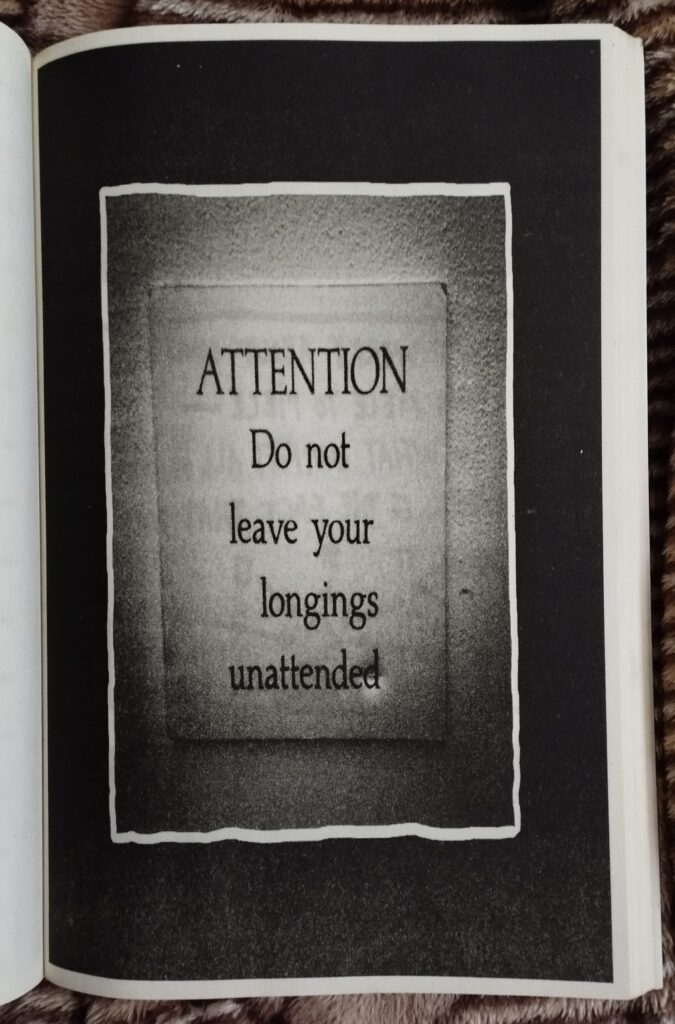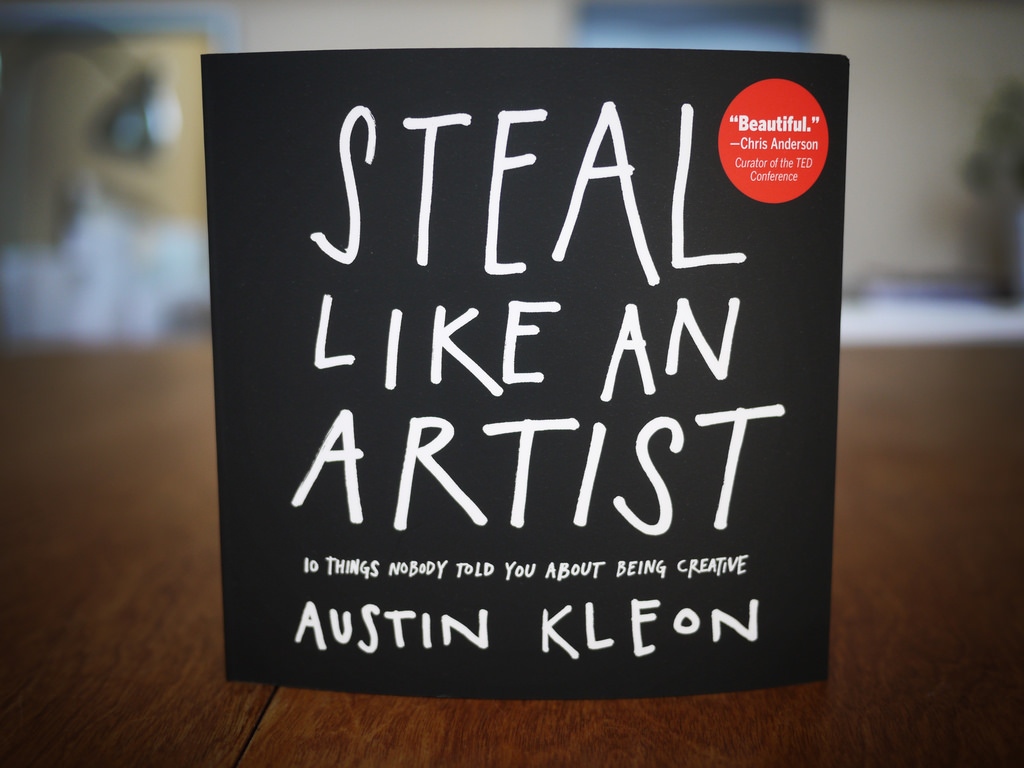‘Steal Like An Artist’ by Austin Kleon describes ways of stimulating your imagination and getting your creative juices flowing when working in a creative field. If you are someone who considers yourself to be an artist, this is the book for you. If you think you’re a wannabe artist of any kind [art, craft, writing, etc.], that’s all the more reason to give it a go. Start with one lesson from the book if you feel like you’re sometimes stuck in an unproductive rut. See how applying the lesson can transform your fundamental processes. Divided into ten parts, Kleon summarises his learnings about the creative process in this book.
- #1 Steal Like an Artist
- #2 Don’t wait until you know who you are to get started
- #3 Write the book you want to read
- #4 Use your hands
- #5 Side projects and hobbies are important
- #6 The secret: Do good work and share it with people
- #7 Geography is no longer our master
- #8 Be nice. The world is a small town.
- #9 Be boring. It’s the only way to get work done.
- #10 Creativity is subtraction
About the Author
“Austin Kleon is a writer who draws,” claims the bio on his personal website.
I first heard about Kleon from his now-160k+-strong Instagram account of quirky posts. It led me to his newsletter, an absolute gem of a rabbit hole to fall down into. He started his journey by posting his poetry on his blog and then continuing with the unique medley of art and wordplay he is known for today. He is the bestselling author of five books, with Steal Like an Artist being the second one in a row.
Now, let’s talk more about the book!
The book comes with a set of 10 principles that would help you [and have helped the author] in unleashing your creative side. “10 things nobody told you about being creative”. Sure, being creative is difficult; expressing your creativity is more so. The product that comes from understanding said principles don’t have to be.
Now, let’s talk about the ten principles mentioned in the book.
#1 Steal Like an Artist
Every creative piece is, at the least, inspired by another creative piece.
This principle isn’t about ‘stealing’ in its exact, legal [or illegal?] sense. This is about the way everything you do, no matter how hard you try, is a product of you and your environment.
Nothing is completely original. There is inspiration everywhere. There is no definitive way of knowing where your thoughts come from. The books you read, the movies you watch, the trees you so enjoy looking out the window while putting off that all-important assignment. You are more than the sum total of your experiences. That’s what makes your work originally yours. Devour as much as you can from wherever and whatever interests you. But also, remember to move on to the next thing as soon as you are done with it.
Things that stick in your head can come back and show up sneakily in everything you do. Kleon’s advice here is to not worry about technicalities and feel free to ‘steal’. He also provides a helpful chart on ‘good’ v/s ‘bad’ stealing.
#2 Don’t wait until you know who you are to get started
You always think you want to start your own blog, write your own book, or create your own set of paintings. But the fear of perfectionism holds you back. The fear of “I don’t know what I’m doing, so I’ll wait until I figure it out” should not be an excuse, he says.
The perfect time to start is now. You should go ahead and make things without having to pass any checklist. There will be no light glowing above your head one day that will let you know what you need to go for what you want. If you ask the most successful people you know where their ideas come from, they will tell you they have no idea. If you ask them what their process to success has been, they will say that they just showed up every day and did their bit. More often than not, the best pieces come out of something most people don’t like to hear about. Why? Because they reek of boring, old consistency.
This includes an all-important list of what it means to steal, well, and steal well.
#3 Write the book you want to read
In this section, he points out that writing about what you like is better than what you know. You might think that you are ‘supposed’ to write about engineering because you have a degree in it. But if you spent your college lectures binge-watching One Piece episodes, start with those! Coming from decades-old wisdom, Kleon even manages to convince you of the importance of fan fiction.
Building from his previous arguments, he encourages you to take a good look at what you spend your time on. What kind of authors you read, what kind of music you listen to, and go from there. This advice reminds one of the late author Amy Rosenthal, who said –
“For anyone trying to discern what to do with their life, pay attention to what you pay attention to. That’s pretty much all the information you need.”
#4 Use your hands
This section is about getting your hands dirty. Technology has made several things easy for us, indeed. But it has also discouraged people from creating physical work, one of the best-proven methods to get your imagination running.
There are only two steps to this process.
- Step away from the screen.
- Put your hands into wherever you can see the results.
Additionally, don’t sit down. Stand, mess around, use writing/art/craft tools, and make something – Anything. Let it be easy, let it be childish, let it give you joy.
He describes how he has two desks in his office – analog and digital. Anything electronic is a no-no on the analog desk. He believes it is purely for handiwork that brings out the best side of creativity.
#5 Side projects and hobbies are important
This chapter loudly claims that you should ‘practice productive procrastination’. What does that mean? The things you do when you’re putting off undesirable work are the things you should be focusing on.
This principle also narrows down the importance of having some time each day to get bored. Let your thoughts wander to whatever land they want to explore; take the time to enjoy it. Many productive lifestyles enforce this rule. In the book Hyperfocus by Chris Bailey, he describes the theory of ‘Scatterfocus.’ Scatterfocus, or intentional mind-wandering, can help you become more focused in your work. It, in turn, can help you become more creative and deliberate.

#6 The secret: Do good work and share it with people
If you are just starting out, you are likely to feel bogged down by expectations of being ‘known for’ your work. Kleon advises that you should not let that feeling surpass the actual process. Basically, don’t count your chickens before they hatch. Tend to your eggs, and take lessons from others who know more. He adds that you must use your obscurity to your advantage – talk to people, make mistakes, and ask for advice.
Additionally, collaboration fosters creativity. So, continue to do what you must with the people you must do it with. If you’re lucky, what you love doing will eventually love you back.
#7 Geography is no longer our master
This one is pretty self-explanatory. The world is now one. It is almost without boundaries, and Kleon insists we make use of that. Parallelly, we need to change the boundaries our brain is comfortable with. Challenging your brain fosters the need for either creative adaptation or creative adoption. His best counsel? Move around, travel outside your familiar territories, get to know new things and new people, and see the magic a new perspective creates.
Distance and difference are the secret tonic of creativity.
~ Jonah Lehrer
#8 Be nice. The world is a small town.
As we come towards the last few principles, Kleon shares his two cents on the social setting you are part of.
Simply put, this is his advice.
- Surround yourself with friends.
- Ignore people who put you down.
You are an amalgamation of the top five people you spend time with. Thus, you must ensure that it averages out to a fulfilling life with constant learning. Write to people; talk to people; engage with people you know and don’t but want to. Have friends for inspiration to create, and use enemies for inspiration to let it out in your work. Use everything as positive reinforcement of what you do and how you do it.
#9 Be boring. It’s the only way to get work done.
The secret is easy to say and a thousand times harder to do. Kleon emphasizes that the only key you need to get results is the 3Cs – Consistency, consistency, and consistency. Be regular, take care of yourself, and don’t get carried away by a million dreams of fame. Create a schedule and learn to stick to it. As James Clear has said, you fall to the level of your systems. Work to make your system an efficient routine of habits best built step-by-step. You strengthen every previous streak as long as you assemble them one over the other.
Take care of yourself. Stay out of debt. Keep your day job. Get yourself a calendar. Keep a logbook. Marry well.
#10 Creativity is subtraction
Edit.
Need he say more?
—
I love how you can view each principle on its own or let each one build on top of its predecessor. The book kills many doubts and fears you usually have about getting creative. It encourages you to put your foot down and just get started. It fosters a sense of individualism and independence to own your work. This is an inspiration with its several no-nonsense quips on breaking myths about the work.
If you do end up reading this book, I’d suggest buying your own physical copy – the last page leaves space for the readers’ “Doodles” section. You can’t expect anything less from an artist.
To conclude, I would like to leave you with something to chew on. Never for one second should you believe that there exists a formula for a certain kind of success. You have the power [some might call it an anti-power] to make your own formula and make sure nobody else takes it as seriously. Make your plan, and stick to it. You are what you consume every minute of every day.
So, what do you want your days to look like?

